|
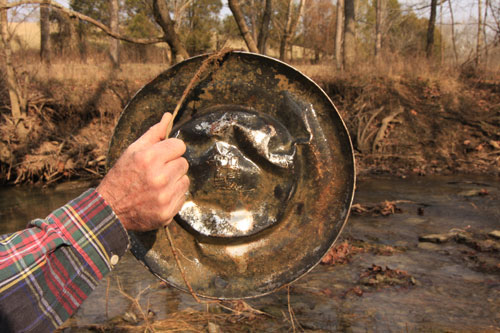
Trash removal from Kentucky stream. Found: rusty hubcap.
(*photo credit)
December 1, 2010
ALL Can Be Earth Healers
Recently
an academically-inclined friend asked me why I expected all kinds of people to
be like me and thus forsake their own vocational calling. The misinterpretation
deserves a response, for each and every individual inhabitant of this planet can
be an Earth Healer -- and they don't have to be like me. One can do this
without doing public environmental advocacy.
*
Gardeners and farmers have a challenge to make their plots a mini-example
of what the rest of the world could become;
*
Poets and authors, especially novelists, could draw others through their
works to the urgency of current action;
*
Parents and homemakers must realize that their dwelling is to be a
starting place for all to see that Earth can be healed and made more whole
again;
*
Religious leaders could insert in homilies and sermons some mention of
the need to take healing as a ministry of all people;
*
Youth and athletic leaders could encourage youth and others to live
simply and to donate time to help others;
*
Health caregivers can donate time and skills to the poor in various parts
of the community or world;
*
Students can plan for careers that are for assisting others and can give
encouragement to their peers;
*
The sick, aged and retirees who have extra time to pray ought to offer
their sufferings in a sense of gratitude to God and thus discover and
communicate the power of their offerings for the entire global healing
enterprise;
*
The technically-inclined and engineers must be willing to explore and
advocate for more appropriate technologies;
*
Academics and teachers must break the hold of peer pressure and speak out
as witnesses and encourage others to do likewise, and thus break the culture of
silence;
*
The military must see that the discipline that they use could be applied
for the good of all people in times of grave need;
*
Elected officials must face the reality that profound change in the
economic and political system is necessary in order to save our wounded Earth;
and
*
The wealthy and business people must voluntarily give up any surpluses
for the sake of the poor of the world.
Prayer:
Help us, Lord, to convince all to be Earth Healers.

Leaves of young oak, late Autumn color.
(*photo credit)
December 2, 2010
Sustainability: An Ambiguous Concept
In
late summer, I had the pleasure of a rare person-to-person visit from my
long-time colleague and friend, Art Purcell and his wife Debbie. Art is
teaching an on-line course for the University of Denver entitled,
Sustainability: Policy and Practice. I told him that I seldom use the word
"sustainability," because it has a variety of meanings depending on one's
individual political and theological stances. Art is cognizant of differences
and has in his syllabus included a discussion of two books dealing with
different public and private policy approaches. Fine, but much depends on the
ultimate lecture content. Denver, an academic institution with deep Christian
origins, must take a public politico-theological stance that is prophetic,
namely, that the present unchallenged politico-economic system is unsustainable.
Repeating
what I say in Reclaiming the Commons found on this website, I note that
those who regard "sustainability" in its present form either mean sustaining a
status quo or tweaking a dysfunctional system so that a modified status quo will
continue. Instead of trying to modify non-sustainable systems, we must initiate
a new and socially just sustainable approach. To paraphrase Abraham Lincoln, we
should not have a world of haves and have-nots. If such continues, it is a
direct road to moral and financial bankruptcy. The socio-economic system must be
changed to something sustainable. Prophets say, "what happens, unless," not
"what will happen."
Real
sustainability will demand that multi-trillion-dollar- fortunes now sequestered
in banks and tax havens be made public and taxed. The vast wealth that belongs
to ALL the people must be freed for employing the countless hordes of the
unemployed for the construction of adequate housing, primary schools, health
clinics and rural roads, for furnishing fertilizers for food crops, for
establishing agricultural marketing infrastructure in poor countries, and for
returning health workers to their native lands. Some of the collected taxes
from people making ungodly salaries must be redistributed for decent wages for
literacy trainers, domestic caregivers, construction workers, and others doing
meaningful work. Banking institutions too big to fail are a threat to all of
us, and must be downsized and allowed to fail. The corporate "person" must be
seen as a figment of the imagination. Billionaires' incomes must be capped.
Sustainability
without profound reform is wishful thinking. It takes away from valuable time
needed to truly reclaim the commons for the benefit of all. Sustaining the
present mode of thinking will prove disastrous and that is why this is a
fruitful subject for course work. It may be the road to a security that is not
being met by the 1.5-trillion-dollar world defense system, half the costs of
which are crippling the United States.
Prayer:
Lord teach us that true sustainability and freedom from bankruptcy must go
hand-in-hand.

Lines of communication in small Kentucky town.
(*photo credit)
December 3, 2010
Communications: The Overlooked Commons
This
is the day we recall that St. Francis Xavier, the great missionary, looked out
from a lonely isle off the coast of China and, in contemplating the vastness of
the field before him, passed on to eternal life -- a relatively young man though
already burnt up with zeal and the desire to continue to serve the Lord.
Sharing
comes through communicating with others, whether that act extends to
neighbors, shut-ins, prisoners, or the totally neglected. Sharing the
predominant language should be encouraged on a local community level provided we
do not inflict hardships on anyone such as slow learners. Often newly arriving
people are literate, but do not know the predominant language. The ideal is to
retain native language skills while becoming fluent in the new language -- a
challenge to some with limited time and skills.
Many
people seek to hide their limited reading and writing abilities. Literacy
campaigns in which we may choose to participate, often require extensive
tutorial resources that can include the services of schools, churches and civic
organizations as well as retirees willing to work at one-on-one tutorial
levels. Literacy frees the reader to venture into vast information areas
and thus to become a resource to the entire community. Literacy programs using
educational films and tools could promote general knowledge -- the continents,
nations, cultural habits, neighborly relations, and ordinary modern business
operations.
Internet
is another manifestation of the communications commons, together with such
devices as cell phones and computers. This very Internet must remain free and
open for use by all people -- for the freedom to publish and spread the word has
revolutionized the way we act. Efforts are constantly being made both by
nervous governments and by greedy and power-hungry, profit-seeking larger
communications networks to control the Internet.
The
ability of a world to connect socially with others has many obvious good effects
such as breaking the curse of isolation by allowing lower-cost exchange at
almost an instant with people in other parts of the world. Such social contact
also allows for national oppression to be publicized and for the shaping of a
freer global economy and networking among peoples. Through rapid communication
we can become one with others. However, such easily available communications
can result in excessive interacting, when other practices are demanded such as
study or driving. Perhaps it may be a waste of time meant for other pursuits.
Pornography can be easily disseminated in an unprotected world; the good names
of individuals can be harmed by defamation of character. Nevertheless, even
considering all potential evil effects, we can still find immense value in
reasserting the commons of communication.
Prayer:
Lord, help us see our prayer to you as our most important form of communication.

Christmas decorations, artificial and real.
(*photo credit)
December 4, 2010
Artificial vs. Real Christmas Decorations
A
general rule is that live vegetation is more loved than artificial greenery.
However, a second rule is that some decoration of whatever variety is generally
better than little or no decoration at all. Tell it through flowers means
freshly-cut bouquets that are more scented and aesthetically pleasing than
artificial ones. The contrast between an European cemetery where live beds of
flowers are prominent and a graveyard with artificial bunches of flowers is
telling -- but the latter has far greater beauty than the forsaken burial sites
that sometimes exist in our countryside. Artificial flowers for patients and
celebrants of anniversaries have a value and longer lasting potential -- but the
real flowers with scents mean so very much. Need we say more?
Holiday decorations are
those personal choices that crop up every year. Real holly and mistletoe are
expensive and hard to acquire in some places. In the era of the Great
Depression we devoted one annual Sunday afternoon to the selection of our "weed"
cedar bush for the holidays, and to this day the smell of cedar brings back a
warm feeling of Christmas cheer in a loving familial way. Nevertheless, elders
certainly may choose artificial decorations that they can pull out each year
without the bother of buying -- or gathering -- the fresh stuff.
However,
our "golden eagle" Earth Healing consultant Sally is part of a tree-farm
couple. Live trees are holiday treats that can be more deeply appreciated; the
business of growing these can be green application of cultivation for proper
consumer use and a legitimate crop. Live trees are pleasing to behold and to
smell and truly enliven interior space. Live vegetation involves selecting,
purchasing, and decorating -- all are part of a ritual that gives meaning to the
event celebrated. Greenness can be enhanced if the tree is rooted, and then
planted in greenspace in the yard or field. A modified green practice is to
recycle the trees through chipping them into wood- wastes for use around shrubs
and in cultivated or walk areas, or to be left in heaps for wildlife
protection.
Artificial
decorations can be safer -- but not necessarily so. A dried out tree or
vegetation can be a fire hazard but, by keeping the plants moist, care can be
taken to ensure that nothing tragic happens. The safety of artificial lights
contrasts with the lit candles of yesteryear, whether these were implanted in
holly wreathes or Christmas evergreens or in a young maiden's hair (on December
13th, St. Lucy's Day). Heaven forbid! Statistics do not exist for the damages
done in those less safety-conscious times, but enough fires are reported in
history to surmise that fire prevention was never perfectly practiced.
Artificial lighting must be moderate and involve the use of energy-efficient
bulbs.
Prayer:
Lord, help us to choose the things needed to enhance celebration but with
safety, beauty and cost in mind.
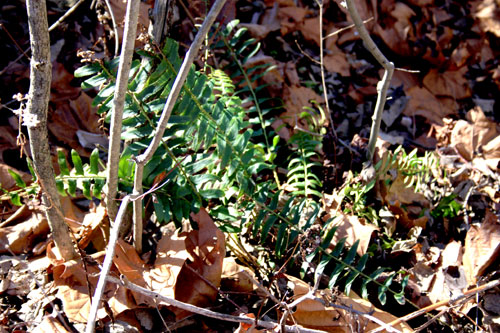
Christmas fern, Polystichum acrostichoides.
December 5, 2010
Return Christ to "Xmas"
Therefore,
I will praise you among the Gentiles and sing praise to your name. (Romans
15:9)
"The reason for the season"
is heard and seen in Christian literature. Some dislike the use of an "X" with
reference to Christ or Christmas even though this is the symbol of the 22nd
letter of the Greek alphabet named "chi;" this is the first letter of
Christus -- and has been used symbolically for Christ for centuries.
However, unknowing Christians today may regard the use as an attempt to remove
Christ from Christmas. In my own shorthand I have long used "Xt" for Christ and
"Xmas" for Christmas.
The
battle often pits materialistic commercial interests against the attempts by
religious adherents of the Christmas event. Few recall that one-hundred and
fifty years ago in Puritan New England, Catholics who wanted to observe
Christmas were not permitted to take the day off -- shades of modern 24-7 stores
and their overworked and never-free salespeople who do not want to jeopardize
their work by seeking to attend Sunday services.
Why
is this battle over "Christ" so important? It is not to be a triumphal attack
on other religions or even on the more celebrating and the less celebrating
portions of the Christian community. Rather this is a battle over the dignity
and lives of all people versus the privilege of a few to control what they so
desire at the expense of those who barely make a living. This is to emphasize
that Christ comes with Good News; the saving power of God extends to all people
in the world -- not just to the wealthy or the nobles or the notable characters
in this world.
If
we see this event in its fullness, we see that it is God's free hand that enters
into human history in a very special way and prepares us for a life of holiness
and responsibility for our communal welfare. Our personal good and the Common
Good are so deeply intertwined; true happiness is to share here on Earth in a
community. This is even before an eternal heavenly bliss is to be established
as a Kingdom of peace, love and happiness. In part this kingdom is anticipated
as established in our individual hearts whether we reside in homes or senior
citizens places or prisons.
A
worshipping community with peace of soul can establish the Kingdom of God in a
surrounding world of hostility and oppression. Furthermore, this growing sense
of communal spiritual empowerment, this kingdom of love and peace can extend
through democratic efforts to a wider world. With efforts albeit limited and
imperfect we can begin to address the injustices that exist among various people
on this Earth -- the inequality of wealth, the lack of food, housing and other
resources.
Prayer:
Lord, give us the energy to make this a meaningful season wherein the meaning of
Christ's coming is deeply appreciated through our good words and deeds.

Pets enjoy gifts, too.
(*photo credit)
December 6, 2010
Gift-Giving and St. Nicholas
Much
like St. Valentine, St. Nicholas, a generous fourth century A.D. bishop of Myra
in Lydia, is popular in our culture and yet his real life is hardly known. In
some parts of Europe, this day is still a time to give children gifts. This is
rarely practiced in this country, for the 25th is the gift-giving time. Maybe
we need to consider a few gift-giving hints some of which are repeated from year
to year.
*
Give from the heart in such a way that the heart is felt in both the act of
giving and the gift content. When it takes an extra effort, others appreciate
it all the more -- most of the time. However, part of "heart" is that we do not
expect thanks.
*
Give some gifts to people who cannot possibly return more than a look of
recognition or even less -- especially to the severely mentally challenged.
Quite often the normal caregivers are weighed down with lack of recognition;
encouragement will be grateful in the name of the patients they serve.
*
When recipients are in full use of their faculties, a pure gratuity could be
asked by us. This would be in the form of a spiritual effort such as a prayer.
It is important that the receiving person has the opportunity to communicate in
a meaningful manner. If this is not asked, a recipient can take the gift for
granted -- and thus a false culture of charity is fostered.
*
The delivery can be important whether in the form of personal visit and
presentation or a personal note that accompanies the gift. Often the manner of
presentation means as much to the one receiving the gift as the gift itself, for
it is often a means of expressing the heart-felt motivation from within us.
*
Give something that is treasured. It removes our own sense of possessiveness
when God gives so much to us. Persuading a budding materialist to part with a
favorite toy or keepsake is a great victory. The recipient will possibly
appreciate that this has meant so much that it is shared by the giver.
*
Encourage others to give also during this season of peace and love. A major
gift that some will not immediately understand is reconciling divided parties
with each other at this time.
Think
seriously about appropriate gifts. If someone suffers from overweight, do not
burden that person with sugary delights that would better fit a super-active
youngster who burns up calories quite rapidly.
Prayer:
Lord, teach us to give and not to count the cost in time and effort. Help
us see that material gifts are not necessarily the only ones of value.

Mushroom patch appears after December rains.
(*photo credit)
December 7, 2010
Energy Efficiency as the New Frontier
Once I was asked the
question at an energy ethics consultation -- if solar energy is so easy to
obtain, are we not able to use as much as we want? The mentality is what is
scary as using what we want implies overuse. Besides, resources are needed for
fabricating and maintaining the solar devices. However, if left unasked, such
questions go unanswered. One of the weaknesses of a consumer culture is that it
devalues the effects of using less -- for more is always regarded as
better. Thus to conserve rather than to use is hard to implement even though
any serious reflection in this energy-conscious age would say otherwise. This
was the theme of The Contrasumers: A Citizens Guide to Resource Conservation
some thirty-seven years ago.
A
new generation of compact fluorescent lights (CFLs) use about one-third or less
the energy used by traditional incandescent bulbs. Lighting cost is to increase
from $13.5 billion to $32.2 billion in 2015 according to Environmental Leader,
and about one-fifth of electricity is used for lighting. The U.S. Department of
Energy reports that over the next two decades $120 billion in energy costs could
be saved by adopting LEDs (light-emitting diodes). LEDs are on track to capture
half of commercial lighting market by 2010.
David
Goldstein in his new book, Invisible Energy: Strategies to Rescue the Economy
and Save the Planet shows a variety of ways that our nation could reduce
energy consumption by 80% in the next four decades. The truth that part of the
energy industry may wish to overlook is that energy efficiency is a multi-win
situation:
* Fewer powerplants need to
be built and the investments can be diverted to adequate housing, public
infrastructure enhancement, and food crop production;
*
Human health can be improved through less pollution such as ozone and
particulates resulting from fossil fuel utilization;
* Fossil fuel and other
emissions including carbon dioxide and methane as major climate change agents
can be avoided;
* Consumers can save on fuel
and utility bills while using less energy and getting the same benefits;
*
An entirely new philosophy of life that replaces an economy based on
consumption of goods could be championed. A conservation-based economy would
then turn attention to the many who do not share the benefits of the richer
cultures of the world.
Prayer:
Lord teach us to value the power of being efficient in what we do in
energy-related areas.

Mary in the garden. Historic Cane Ridge Meeting House. Paris, KY.
(*photo credit)
December 8, 2010
Mary: Pure Transparency
May it be done to
me according to your word. (Luke 1:37)
To proclaim a
monumental and Earth-shaking "yes" demands a special person and, when this
voicing is done in a simple setting, it is all the more important that pure
transparency is complete. Any fault will mar the effectiveness of the
proclamation, for it was in the recesses of a distant past that our ancestors
uttered a "no" that resonate down through future generations.
We were all prepared
in the minds of God for our calling -- and each has a unique calling to serve
the Divine Majesty. As St. Paul says, we were chosen from before the foundation
of the world (Ephesians 1:3-6, 11-12)) to be holy and without blemish before
God. For it was in God that we were all chosen, destined in accord with the
purpose of the One who accomplishes all things according to the intention of the
divine will. So all of us exist for the praise of the divine glory, we who
first hoped in Christ.
Mary was certainly
called to be the first to hope in and with Jesus Christ, and such an "in and
with" demanded a transparency, for a blemish of any sort would distort the utter
hope. For many of us, the "yes" of our choices contains the taints of a
long-past uttered "no" in which the very genes of dissent reside. Like all of
us, Mary's was a calling from all eternity; but hers was the unique calling.
Mary's transparency in addressing this call had to be perfect, otherwise the
calling would have been less spiritual in an imperfect world. The uniqueness of
the word called and deed performed demanded a unique recipient of the call.
Transparent word/deed means capable of being seen through and heard distinctly.
Mary was the bearer of the Light of the World and thus a spiritual transparency
was in order. Any bit of opacity would have dulled that light; God's intentions
were that the Messiah was to be seen and heard. Mary was first to bear the
light/Word, and John was prepared to present Christ to an awaiting community.
For each the call was truly unique, but so is that of each of us.
My birthplace, Mason
County, Kentucky, is known the world over for "transparent puddings," put in the
plural because there is a surprising variety of recipes listed with plenty of
eggs, sugar, butter, Karo syrup, a little flour, and a dash of vanilla in some
cases. My mother made her unique plum pudding based on a modified recipe --
something that added flavor, not blemish. Mary advanced in her calling
with maturation and thus added to the uniqueness of her total call. She heard
the Word in the most profound way and lived it throughout her life. However,
the transparency of the first call gave it the world renown that was intended --
and that we celebrate today. Each of us is called to be transparent in
receiving God's word and then to add the "plum flavor" of our personal calling.
Mary is our guide.
Prayer: Hail
Mary, full of grace, the Lord is with you.
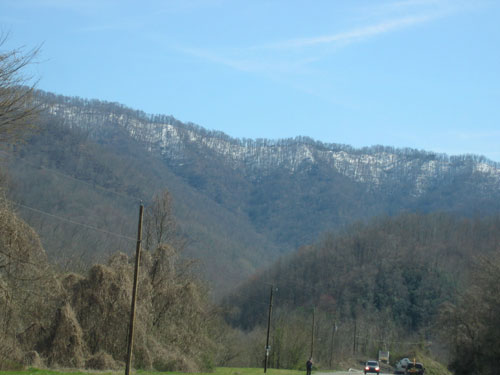
Snowy scene along a rural road in Harlan Co., KY.
(*photo credit)
December 9, 2010
Caroling and Christmas Songs
Among more remote
preparations for Christmas ought to be the gift-giving of ourselves. Many do
this with gifts of music and song. We may not appreciate how much songs mean to
others to set the tone of the holidays. The average church-going Christian has
a greater repertoire of Christmas hymns than of any other song series, even
patriotic or school or drinking or children's songs. Thus this is a treasure
worth releasing during this holiday season to brighten the season for others who
tend to experience loneliness in such times when they remember better seasons in
the past.
Some of us have
cultural traditions of coming together in families or communities and singing
during the holidays proper, and for some this is the twelve days of Christmas
(December 25 to January 6). There are few Advent hymns as such, and so people
hardly ever congregate to sing such hymns. We are sometimes slow at seeing
profound changes in our culture and our need to adjust to them. Many times the
elderly who are institutionalized or those living alone are saddened by their
anticipation of a lonely Christmas. A Christmas caroling program in the weeks
leading up to Christmas is the best way to give goodness and joy to them.
Caroling has
traditionally occurred during the twelve days of Christmas (December 25th to
January 6th), but we all realize in our American culture that the Christmas
commercial season is the period between Thanksgiving and Christmas day. Thus,
in essence, the weeks leading up to Christmas form the season, and the
traditional twelve days includes a toning down and even a removal of the trees
and decorations quite early -- often on the 26th of December. Thus a conflict
of cultural celebrations leads the lonely to experience more sadness prior to
the 25th than afterwards, when the songs end so abruptly and popular attention
turns to preparations for football playoffs and bowl games, to New Year's
parties and to anticipating January, 2011, activities. Of course there are
gift exchanges and use of Christmas gift cards.
Church-singing
periods are also important for preparing the congregation for the true
spirit of the season. Originally, I wanted to place songs for the first time on
the 24th (Christmas eve) itself, as though this is the first of the Christmas
events. It is good and well to prepare for those afternoon children's or
evening adult liturgical events, and to do so after adequate scheduling and
plans. However, these need not be the first time the songs are sung for this
year; use these in the advent season.
Celebrate the
Twelve Days of Christmas in some fashion. Encouraging the local media and
parties to include Christmas songs after the 25th of December would be a great
contribution to the spirit of the season. Thus Christmas parties that include
songs could be held during the twelve-day season.
Prayer: Lord,
teach us the value of singing and how this fits into celebrating the season and
helping to heal our wounded Earth.
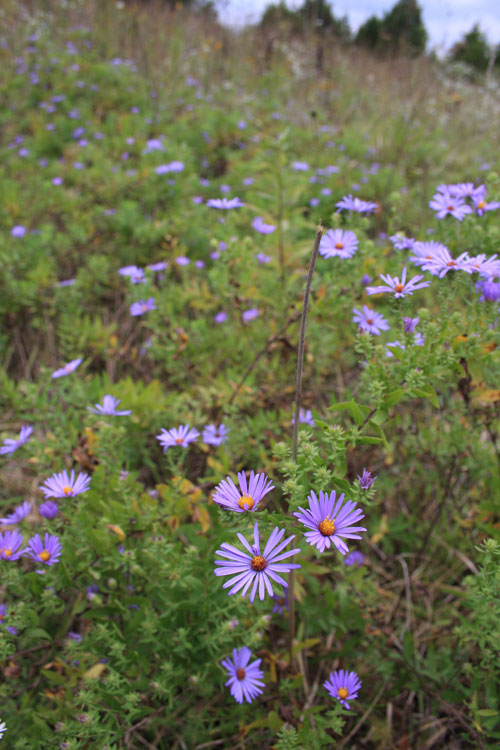
A home's side yard filled with blooming aromatic aster, Aster oblongifolius.
(*photo credit)
December 10, 2010
Rethink Lawns in the Climate Change Era
Few subjects trouble
environmentally-minded citizens as much as lawns. On one side is the
maintenance director of a Midwestern college who confided that lawn care was
greatly reduced because the administration had turned half the greenspace into
parking -- even though the additional spaces were needed for only a few
extraordinary events each year. With an expanse of blacktop there were no more
weekly or biweekly clippings, fertilizing, spraying and weed eradication. I
weakly objected with the statement -- "I guess you noted how much more heated
the campus was in the middle of summer." The response was, "Well the buildings
are all air-conditioned."
In those brief
comments is the heart of the issue. Greenspace even in lawns that take so much
care has advantages beyond obvious aesthetics. Tradeoffs are present! The
greenspace whether in trees or grass is certainly cooler than blacktop and even
somewhat more than gravel or rock surfaces, though institutions would not find
the latter too customer-friendly. Hot summers should make people strive to
conserve on air-conditioning expenditures, and trees certainly are one way to do
this. All the same, the grass of lawns is worrisome, for to care for this takes
time and effort -- and lawn-mowing with gasoline-powered mowers causes air
pollution.
Green-conscious
lawn-lovers can offer several suggestions as modifications to the uniform
bluegrass monocultures that take extra care to water and fertilize. First is to
mow the lawn with human muscle. Obviously this demands extra time and work from
those seeking fresh air and exercise. In fact, it is far better than sitting on
a rider-driven, gasoline-powered mower with its fumes --and noise disturbing the
neighborhood. Greenspace need not be in total monocultural grass but can be
permacultural edible (human or wildlife) landscaping, even if this is over the
initial objections of neighbors. Lawn care is an excellent way to introduce
people for the first time to their own personal environmental choices. It has
worked in our parish to some degree.
Some argue that
neighborhood associations should set rules, and each member must faithfully
follow, i.e., clip monocultural lawns to certain height in order to maintain the
community's economic value. One California resident bravely countered
neighbors' objections and installed a xeriscape (using native semidesert
plants) in her lawn space that never needed lawn care or watering. Over
neighbor, fire personnel (hazards), and police (hideaways) objections, she
fought and won. In a few years the entire block was following suit with far
fewer lawn maintenance costs. Sloped lawns could definitely be put into ground
cover; swamp areas should not be mowed in the first place and could be planted
with water-loving vegetation (no exotic invasives please) after consultation
with local garden experts.
Prayer: Help
us, Lord, to see that resource choices are personal and community decisions
worthy of discernment.

Cedar apple-rust, Gymnosporangium juniperi-virginianae.
(*photo credit)
December 11, 2010
Weighing the Legalization of Marijuana
In northwestern
California, in the counties below the Oregon border, one finds the marijuana
capital of America where the product has great street value. In 1996,
California passed proposition 215 or the "Compassionate Use Act" that made
marijuana legal for prescribed medical purposes. Today, marijuana is legally
dispensed in certain California centers. The second highest marijuana-growing
area in America, here in Kentucky, is where the crop is mercilessly hunted down
and growers could face prison terms for their labor -- while legal distillers
and tobacco growers go scot-free. The three major American-produced, abusive
substances are treated differently. Many regard this as confusing and unfair.
Certainly regulations
could be expected: as to access to minors, to promotion and advertising, on
taxes of all "sin products," and on general commerce. But why not legalize
something the criminalizing of which fills jails with people who are not violent
and are often hardworking. One prisoner told me he was "just trying to make an
honest living for his family." I do not advocate the use of marijuana and in
fact hate the smell of the stuff -- but let's challenge the current governmental
policy with respect to marijuana. Tobacco goes free though it is the number one
killer; alcohol is prohibited in this and the majority of counties in this
Commonwealth. Please weigh these factors:
Positive
* Marijuana causes
far less physical injury and death than either alcohol or tobacco, and is not
properly regulated.
* Legal marijuana is
a form of sin-tax that is quite lucrative for cash-strapped local and state
governments.
* Marijuana has
medical benefits for some sufferers.
* Marijuana conviction
leads to expensive incarceration of many non-violent offenders.
Negative
* Marijuana is a gateway
to more serious drug intake and contributes to overdose deaths.
* Marijuana
legalization leads to lack of prudence in everything from driving to home care
and economy of time.
* Marijuana is
fundamentally anti-social and leads to the separation of people who are
indulging from those who despise the smell and effects.
* Marijuana-intake can
lead to impairment in driving.
* Marijuana-smoking
is profoundly annoying to others.
Prayer: Lord,
teach us to discern properly in our lives.

Remnants of white snakeroot, Ageratina altissima.
(*photo credit)
December 12, 2010
Focus on the Lord in Hard Times
We are going through
very hard times as this holiday season approaches. We are drawn to turn to the
Lord in times of troubles. However, although this can be said simply, even the
turning is sometimes troublesome. This is because we have to abandon our
self-sufficiency and desire to be in control of situations.
John the Baptist,
imprisoned, had little control over his life. He was the prophet straddling the
old and new covenant, and he was unsure with such questions, "Are you the one
who is to come or are we to look for another?" Perhaps we as people on our
journey of faith answer this question in the certitude of faith; yet at times we
may act as though we are looking about for another leader in times of troubles.
It is this turning attention to the Lord that should be our focus as this
Christmas approaches.
The focus
ought to be a faith in the power of the spiritual to overcome the material
elements of this world. We are all distracted by the allurements of this world,
by wealth, by fame and by power of various sorts. Rather, by putting on Christ
as our guide in hard times we are to focus on the suffering Servant and accept
that our spiritual option includes rejection of what is so tempting in this
world -- material success.
The focus
ought to be on love of our neighbor and not on some form of violence or
thrashing out at others. We have seen this temptation to terrorism especially
since the 9-11 event and the emerging of those tempted to burn the Koran, or to
advocate militant atheism, or other distortions of conduct and truth.
The focus
ought to be on hope that we can make things better, not on withdrawing into a
cocoon and attempting to become an asocial faithful remnant. We are to speak
openly on public issues and not to be tempted to remain silent, often forgetting
that silence itself is a partisan political stance. As citizens, we are to seek
a bipartisan transformation to a better world.
The focus
ought to be on a prevailing sense of joy -- for this is Gaudete Sunday, or the
mid-portion of Advent that reminds us of the joy that will soon come. Our times
of troubles are short, and thus we are to preserve an atmosphere of faith in the
future. When we have confidence that good will ultimately triumph, we can have
a peace of soul, and this will permeate our soul in hard times.
The focus on
faith, hope, love, and joy will not be perfect and that requires patience
through our distractions. Our effort is to focus attention on a proper picture
and not to be overly concerned about material gains, a temptation to violence, a
loss of hope in the big picture, and a sadness that comes with troubles.
Prayer: Lord,
help us hear St. Paul calling for patience because our preparations will be
well-meaning but imperfect.
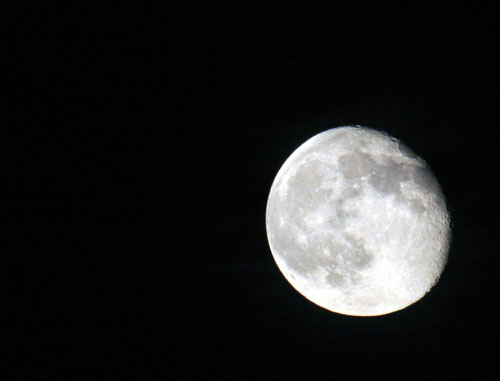
December moon on cold Kentucky night, lighting the path ahead.
(*photo credit)
December 13, 2010
Advent: Alertness in Looking Back and Ahead
Alertness ought to
include all of our activities from walking to cooking, from
information-gathering to awareness of another's cry for help or companionship.
Our driving demands that we constantly look in all directions -- a feat that is
impossible to do simultaneously. We know it can only be approximated by
alertness. In this final month of the year and as we approach the Christmas
holidays, we need both to review the fleeting times that have just occurred and
to anticipate events to come.
What happened in
2010? What will 2011 bring? Both questions taken together help define our
present moment. We live in that suspended instant when the past flees from us
and the future lies just beyond the horizon -- and both are wrapped in some
mystery; the past yearns for an explanation of how we emerged on the scene for a
brief moment; the future contains the mystery of an eternity, which is yet
unseen and unexperienced. Our faith ought to involve an exercise in that
alertness that extends back into the hazy past and seeks to intrude into the
misty future.
We are alert in our
journey of faith because the present's boundaries are so ill-defined by past and
future and the meaning we make of the "present" includes our way of handling
both indefinite spans. What comprises our faithfulness? Our faith includes
thanks for our past and begging to make good our future. These become more than
a birth out there in the receding past and an undetermined-but-certain death
notice leading to an undetermined eternity. Our present moment goes beyond both
events and becomes, for those of faith, spans of time worth thankfulness and
future promise. Do we truly reflect on this present made meaningful in past and
future?
Advent is that season
when we refuse to be forgetful of God's fidelity even when our individual
happenings fade. We likewise refuse to forget that past promise fulfilled opens
the possibility of future promise to be gained. As the end of the year
approaches, we realize the ever-approaching end of our mortal span, always
closer and closer to reality. This is why a balanced and awake adulthood
contains a growing wisdom that realizes life's shortness.
We need to see
alertness as a community and not merely an individual exercise. We as a
community have our journey of faith embracing all who are neighbors. As broad
as we make our own neighborhood, so we stretch our concerns to incorporate more
and more of this world's family and see that our faith journey is part of
journeying together with others. Our vision embraces people of a variety of
faith traditions, all struggling to obtain meaning in lives traveling together
to an ever-approaching eternal horizon.
Prayer: Lord,
help us to be alert to the current situation around us. We are told over and
over in this season to stay awake -- easier said than done. Being awake means
being alert to the needs of neighbors as well as the aches of our individual
journeys.
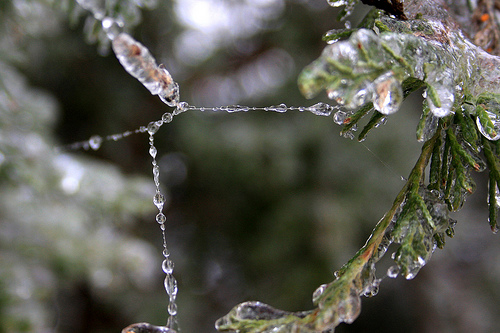
Delicate interwoven strands of ice.
(*photo credit)
December 14, 2010
Basic Elements of a Social Discernment
In an urgent
situation when decisions have to be made, a formal social discernment is
needed. Our planet has reached this level of urgency for, unless we consider
the actions we are taking, we will not fulfill the calling given to us in this
age. This
"discernment" means
weighing all the elements involved in a decision -- something that St. Ignatius
of Loyola focused upon in The Spiritual Exercises. The first focus was
on getting individuals to accept their proper calling in life and to pay
attention to the movements of good and bad spirits. Such a process must be done
prayerfully and, hopefully, with the able assistance of others who have been
engaged in spiritual direction. What about a social discernment on a communal
calling to a way of life?
1. Will to change.
Part of the problem today is that there does not exist a will to change. Yet
the urgency of our day demands that we change habits that are damaging our
world. The privileged want to retain all privileges at all costs; the dreamer
strives to get these privileges; and the spineless remain quiet so as not to
disturb the holders and the aspirants. The spirit of complacency is troubling
and must be identified as such. The comfort of accruing profits at others'
expense is to be exposed and avoided.
2. Openness to
listen. A "discernment," where the result is already known, is not a
discernment but a fruitless exercise in self gratification. An openness demands
an atmosphere of prayer, and yet we know some pray and others do not. One can
hardly expect all to come to prayerfulness, but we can expect that those
seeing the value of prayer will see that their contribution is of utter
importance to the final outcome. All should pray; some MUST pray.
3. Participation by
all. The intellectual or economic elite do not have all the answers. The
poor and voiceless, the anawim of the world, must have equal voice with
others. Proper discernment involves listening to all and affirming and voicing
what they have to say. The Internet offers a forum for such an ongoing
dialog.
4. Practical
steps. Declaring Earth's sickness is a precondition to discerning the
healing process. To say that nothing can be done is despair. To presume that
automatic healing will occur is equally bad. A listening global community could
learn much from the poor who know how to avoid wastefulness and make a living in
simple ways. Champion appropriate technology!
5. Realistic goal.
The ultimate goal is to save our planet and to take practical steps to reach
that goal. Discernment champions goals as much as awareness of the condition
and practical steps to be taken to solve the problems.
Prayer: Thank
you, Lord, that you have given us the opportunity to assist in saving our
threatened planet. Help us to discern the condition, see the healing process,
and follow it.
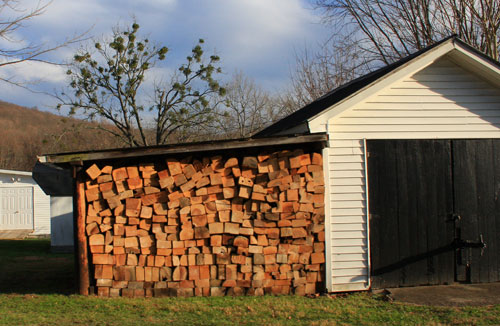
Neatly-stacked wood. Rockcastle Co., KY.
(*photo credit)
December 15, 2010
Bill of Rights Day
On this date,
December 15, 1791, the Virginia legislature ratified the first ten amendments or
"Bill of Rights" (passed by Congress in 1789), and thus brought to the required
three-fourths the states granting approval. This allowed the amendments to be
incorporated in the United States Constitution.
I. Freedom of
Speech, Press, Religion and Petition --
Congress shall make
no law respecting an establishment of religion, or prohibiting the free exercise
thereof; or abridging the freedom of speech, or of the press; or the right of
the people peaceably to assemble, and to petition the Government for a redress
of grievances.
II. Right to keep
and bear arms -- A well-regulated militia, being necessary to the
security of a free State, the right of the people to keep and bear arms, shall
not be infringed.
III. Conditions for
quarters of soldiers -- No soldier shall, in time of peace be quartered
in any house, without the consent of the owner, nor in time of war, but in a
manner to be prescribed by law.
IV. Right of
search and seizure regulated -- The right of the people to be secure in
their persons, houses, papers, and effects against unreasonable searches and
seizures, shall not be violated, and no warrants shall be issued, but upon
probable cause, supported by oath or affirmation, and particularly describing
the place to be searched, and the persons or things to be seized.
V. Provisions
concerning prosecution
(see
tomorrow)
VI. Right to a
speedy trial, witnesses, etc. -- In all criminal prosecutions, the right
to a speedy and public trial, by an impartial jury of the State and district
wherein the crime shall have been committed, which district shall have been
previously ascertained by law, and to be informed of the nature and cause of the
accusation; to be confronted with the witnesses against him; to have compulsory
process for obtaining witnesses in his favor, and to have the assistance of
counsel for his defense.
VII. Right to a
trial by jury -- In suits at common law, where the value in controversy
shall exceed twenty dollars, the right of trial by jury shall be preserved, and
no fact tried by a jury shall be otherwise reexamined in any court of the United
States, than according to the rules of the common law.
VIII. Excessive
bail, cruel punishment -- Excessive bail shall not be required, nor
excessive fines imposed, nor cruel and unusual punishments inflicted.
IX. Rule of
construction of Constitution -- The enumeration in the Constitution, of
certain rights, shall not be construed to deny or disparage others retained by
the people.
X. Rights of the
States under Constitution --
The powers not
delegated to the United States by the Constitution, nor prohibited by it to the
States, are reserved to the States respectively, or to the people.

Potted paperwhites emerge for holiday delight.
(*photo credit)
December 16, 2010
Distinguishing Primary and Secondary Rights
V. Provisions
concerning prosecution -- No person shall be held to answer for a
capital, or otherwise infamous crime, unless on a presentation or indictment by
a Grand Jury, except in cases arising in the land or naval forces, in the
militia, when in actual service in time of war or public danger; nor
shall any person be subject for the same offense to be twice put in jeopardy of
life or limb, nor shall be compelled in any criminal case to be witness against
himself, nor be deprived of life, liberty, or property, without due process of
law, nor shall private property be taken for public use without just
compensation.
Conflicts over rights
have existed from the start of the Constitution. Certainly when private
property is involved and this is held in vast amounts, the power of the private
holder can be so great as to include special access to political influence.
This threatens our very democracy. A threat to our very life or liberty raises
questions about primary rights where human life and dignity are involved and
secondary rights when excess property is a matter of consideration. The
corporations ran our elections before the decision (Citizens United vs.
Federal Election Commission) and will do so now -- just with a fig leaf of
"legality." Howard Zinn
The right to life
includes questions of abortion, death sentencing, and assisted suicides. Right
to liberty includes distinctions about infringing on free speech or whether
snake handling is free exercise of worship. However, when it comes to the
pursuit of happiness, there is more discussion, for some possessions
constituting happiness for millionaires could infringe on the rights of others
to food, shelter or life itself.
Where have rights
been infringed upon? In the past two years we have seen Wall Street bankers
plunge this nation and the world into the worst financial crisis since the Great
Depression. Do you think this horrifying act was punished? The excuse of being
"too large to fail" (as though their actions weren't failures) allowed the
banks' privileged few to be rewarded with $700 billion of our tax dollars and
started our nation on the road to unsustainable financial existence.
The "right to
property" has been so infringed upon that it is ludicrous to those who try to
live fiscally sound personal lives. The un- and underemployed see their basic
right to life and livelihood infringed upon. The secondary "right" to property
is now currently being ensured by tax breaks with the often vain hope that
wealthy investors will create jobs. In Citizens United vs. FEC, the U.S.
Supreme Court in a five-to-four decision extended to corporations the right to
bribe political candidates. Again this "right to corporate personhood" is being
challenged by progressive groups in citizen actions (see July 4, 2010).
Prayer: Lord,
teach us to defend the basic rights of all people and the democratic system
needed to preserve these rights.

Firmly rooted, reaching upward.
(*photo credit)
December 17, 2010
Anniversary of Utility-Scale Geothermal Power
We are celebrating
this year the fiftieth anniversary of the use of geothermal energy as a form of
production by utilities of both heat and electricity. In the exposition at
Sacramento this past August, the Geothermal Energy Association (GEA) found much
to celebrate. In 1960, they started construction on "The Geysers," a single
small powerplant north of San Francisco. Since then, this site has become the
world's largest group of geothermal powerplants. Today, the United
States produces about one-third of the 11 gigawatts of deep geothermal power
utilized by 24 countries; geothermal is a rapidly expanding source that should
hit 18 gigawatts by 2015. Currently the Philippines is second in construction
with 1.8 gigawatts. Some 70 nations make use of geothermal heat from various
sources.
Geothermal, along
with wind and solar, is a renewable energy source that comes at a rapidly
declining cost per unit generated. The source is relatively widespread on this
planet and has massive potential. Experts estimate that when fully utilized,
geothermal could furnish 50,000 times the energy needed at this time throughout
the world, with small environmental costs and manageable economic ones. One
must realize that geothermal efficiency is lower than that of conventional high
temperatures from boilers and is only around 10-23%. However, geothermal is
more reliable than solar and wind, the variable sources of renewable energy.
Unlike
far-more-polluting accessible coal, oil, and even natural gas, this resource has
great potential for further development, although there are some environmental
concerns as with all forms of energy generation systems. Tapping fluids from
deep underground geothermal operations does allow some carbon dioxide, methane,
hydrogen sulfide, and ammonia to be released, but nowhere near the carbon
dioxide levels from fossil fuel facilities. The hydrogen sulfide and ammonia
can be captured easily by standard emission-control systems. Some toxic
materials are released in the geothermal fluids that come to the surface, but
these fluids can be reinjected to enhance further geothermal production and to
reduce any possible environmental pollutants that may affect groundwater and
surface water.
Economically, the major
cost of geothermal energy is the drilling of the initial wells -- about
one-fifth of the total cost of the operation. Although a few wells fail,
generally geologists can predict good returns from deep drilling operations.
Plants stay operating over long periods of time without major maintenance
costs. The power is generated at the wellhead and does not incur fuel
transportation costs as occurs with most coal and petroleum-based powerplants;
security and disposal programs are far less than for nuclear powerplants; and
resulting carbon dioxide far less than for even natural gas. Experts regard
geothermal as one of the bright energy promises of the late twenty-first
century.
Prayer: Lord,
let us see Earth as a source of dependable energy.

Buffalo Mountain Wind Farm, near Oak Ridge, TN.
(*photo credit)
December 18, 2010
Are Promising Renewables Enough?
Shadows and bright
spots form a patchwork on the energy picture of our country and world. In a
year when coal power plants increase at one per month in the United States and
one per week in China, we still note that in both of these energy powerhouses
renewable energy applications are brightening the energy picture. However, it
is evident that coal use will continue for years.
The U.S. Energy
Information Administration reports that in 2009 the U.S. renewable energy market
became 8% of total U.S. market (from 7.4 to 7.7 quadrillion Btu) while total
energy consumption decreased nearly 5%. The increased renewable energy
sub-sections included biofuels (+173 trillion Btu), conventional hydroelectric
(+170 trillion Btu), and wind (+150 trillion Btu). As for electricity
generation, wind has been making remarkable progress, going from 5% of the total
renewable energy generation in 2005 to 17% in 2009. Some 95% of the renewable
energy increase in electricity generation came from wind energy. Wind is
rapidly becoming competitive with other non-renewable energy sources but, as is
often pointed out, that wind needs to be combined with natural gas powerplants
that assume the slack on windless days.
One cannot accept the
bright future of renewables without a realistic picture of total energy demand
-- which will continue to rise as BRIC (Brazil, Russia, India and China) become
more important players in the world economic situation. James Hansen in his
book, Storms of My Grandchildren: The Truth about the Coming Climate
Catastrophe and Our Last Chance to Save Humanity, argues that the cutbacks
demanded in fossil fuel energy use to stave off global disaster are not
forthcoming. While he accepts nuclear as one alternative, concerned people
argue that far-lower-cost renewable energy installed on a crash program could
suffice provided that are matched by energy efficiency as outlined in the
reflections on December 7th.
Certainly solar
energy is on the verge of major breakthroughs to where windowpane and roof
coating will be generating in-house solar-generated electricity in significant
amounts. As discussed in yesterday's reflection, geothermal energy has a bright
future. Furthermore, offshore wind energy could supply all our energy needs
when properly utilized, especially for the heavily populated east and west coast
urban areas. In the longer term, tidal and biofuels from non-food crops could
contribute to an ever-enlarging renewable energy mix. However renewables are
not saviors alone; they must be coupled with some existing or innovative fossil
fuel supplies (natural gas), while energy efficiency is implemented in every way
possible. A renewable future awaits a concerted effort on the part of our
nation and world. The question is "Will it get there in time?"
Prayer: Lord,
help us to be realistic about Earth-healing possibilities and not to inflate
renewable energy's role in saving the planet. Renewables AND energy efficiency
are needed.
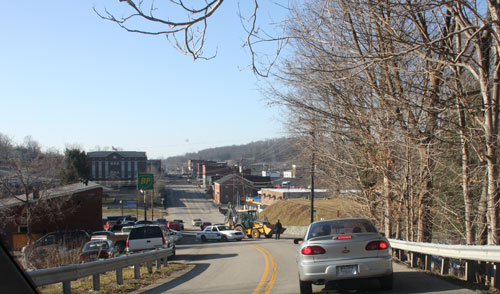
Waiting for repairs, Mt. Vernon, KY.
(*photo credit)
December 19, 2010
Practice Patience in Troubled Times
Be patient brothers
and sisters until the coming of the Lord.
(James 5:7)
On various occasions I
have been told that I may have some virtues but one lacking is patience. These
astute observers are correct, and yet to practice patience is quite difficult
for those of us who are aging, living on the fast track, eating (even
home-prepared) fast foods, driving often near or above the speed limit, and
using fast-track forms of communications. In short, my lack of patience is
related to the life I've chosen to live. We expect much, from cooperative
traffic lights to instant checkouts, from banking service to electricity
delivery. Any lack of instant service overwhelms us and patience is tried.
A holy impatience
must persist in one area. If we see someone beating up another, we would be
insane to approach the victim and say, "Brother have patience for the Day of the
Lord is coming and all will be perfect." Rather we show our impatience and
attempt to halt the assault either through our powers of persuasion or by
calling 911 for police protection. Thus when the troubles involve another, we
struggle to assist them, for their patience should not encourage our
standoffishness. Activity for the sake of another should not be restrained by
our desire to be patient even when we are not totally effective.
Patience is something
to do with our expectation of the Lord. We help prepare the world for the
coming but realize that we will not be perfect and our efforts will lack total
success. That should not make us impatient but rather to make us accept our
limitations and the challenge to grow in patience. However, others, upon seeing
us not lose heart in our imperfect efforts, may admire us. We are doing the
best we can -- though improvement may come.
This deeper way of
accepting a holy impatience at social injustice to others and an equally holy
patience with our own limitations and shortcomings would have apostolic witness
power. We can stand honestly before the Lord and before our fellow human
beings. When we admit limitations, others identify with us, for they often see
their own lack of success, and in many cases are better able to handle their
limitations and live with themselves. Certainly, they can give us better advice
on how to show patience, to occupy down time, to be prepared for and make room
for delays, and to admit freely all human beings are imperfect. It may not have
always been our own fault, and that takes effort to see as well.
Prayer: Lord,
help us to see ourselves as people in need of your mercy, and still show a sense
of willingness to await your coming with equanimity and continued joy and good
humor. Help us establish an atmosphere where others can act in the same way.
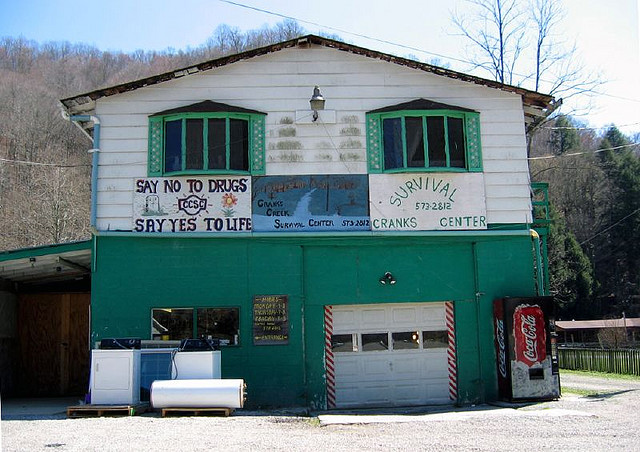
Cranks Creek Survival Center, Harlan Co., KY.
(*photo credit)
December 20,
2010 Getting Smart on Drugs
Guest
Essayist Fr. John Rausch
Texas swapped a
$600 million prison-expansion plan in 2007 for a $241 million plan to expand its
community-based drug and alcohol treatment services. It created residential
drug and mental health facilities for in-prison and post-prison populations, and
halfway houses for new parolees, By 2009 its inmate population declined.
Michigan closed eight
prisons and invested the savings in an expanded network of drug, mental health
and job training services for ex-offenders, Following suit, Kansas also closed
prisons after investing in drug treatment programs and services for parolees.
With fiscal problems facing every state but North Dakota, legislatures are
looking for savings around their prison populations that on average rose 600
percent from the 1970s. So far ten states have addressed the uncritical
rhetoric of "tough on crime" with the companionate wisdom of "smart on drugs."
The United States
with less than 5% of the world's population consumes 60% of the world's illegal
drugs and incarcerates 25% of the world's prisoners. States and municipalities
are discovering that without treating drug and alcohol addiction as a complex
disease, recidivism rates remain high. According to the National center on
Addiction and Substance Abuse, of the 2.3 million prison inmates in America, 1.5
million, or 65%, meet the standard medical criteria for drug and alcohol
addiction and abuse. Its research reveals that drug and alcohol abuse and
addiction are implicated in 78% of violent crimes like assault and rape, and 83%
of property crimes like burglary.
Studies indicate
that drug treatment represents a highly cost-effective way to reduce substance
abuse and crime. According to a 1998 Rand Corporation study, quality substance
abuse treatment versus imprisonment is three times less expensive. To people of
faith the arguments from economics finally accomplished what the Gospel values
on human dignity seemingly failed to inspire. The "War on Drugs" overwhelmingly
targeted the supply source of drugs, but failed to adequately address the demand
use of drugs. It ignored the cultural forces that promoted the euphoric "highs"
and the relief from even the slightest pains. Once a user creates a frequent
pattern, an addiction, whether physical or process, can easily take a hold.
Drug abuse can no longer be viewed merely as a public safety problem leading to
crime, but must be understood as a public health problem dealing with lives.
Thousands of young people in Appalachia and elsewhere have died of drug
overdoses. Federal, state and local governments in 2005 spent $74 billion in
court, probation, parole and incarceration costs for drug and alcohol offenders,
while spending less than 1% ($632 million) on prevention and treatment.
"Getting smart on
drugs" means reaching into the prisons for the redemption of offenders and
grasping the teens in our communities before they fall off the cliff. We're
talking tough love, community involvement and Gospel compassion about a disease
that's killing our culture.
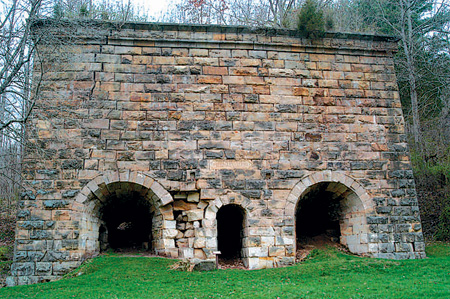
Fitchburg Furnace, near Stanton, KY.
(Photo: Jeff Kerr)
December 21, 2010
Local Attractions: The Fitchburg Furnace
Virtually all parts
of the country or world have attractions that can draw others for scenic,
cultural, historic or other reasons -- and thus we can say with confidence that
all places are unique in some way. As expected, Estill County, in which I
reside, has more claims to fame than just being downwind from the Bluegrass Army
Depot. One attractive aspect is the massive sandstone Fitchburg Furnace, the
world's largest iron furnace when constructed right after the Civil War. In
many ways it is also one of the most beautiful, and some regard it as a work of
art with its unique industrial arches.
This furnace (really
a set of two) was built by Frank and Fred Fitch as the very latest in industrial
technology. However, the bulk materials (iron ore, limestone, and fuel) did not
have, for transportation, either nearby water for barges or operating railroads
-- and thus all hauling was done by animal power and human effort. The furnace
really proved to be a good idea in the wrong time and place, for it was soon hit
by a financial crisis.
In the past year, a
federal stimulus package of over a quarter million dollars made possible the
acquisition of sandstones for replacement blocks from the quarry that furnished
the original blocks. The furnace had been overgrown by trees. The task at hand
is to attempt to reclaim what has been lost to nature. Part of the restoration
includes removal of vegetation and putting a roof over the furnace to keep out
rainwater that could further damage the structure. Fencing, parking,
educational displays and draining areas are being added to show the industrial
plant (which only operated for four years before closing during the economic
Panic of 1873). This closing brought an abrupt end to the first American iron
production region (southeast Ohio and northeast Kentucky).
Enormous amounts of
charcoal were demanded to make a ton of this pig iron for furnaces that had to
run continuously day and night at very high temperatures. The production of
that charcoal required all the trees for miles around, and the entire section of
the county was denuded of forests during this brief period of time.
Retention of historic
sites is a value in itself for it shows a respect for our industrial past. Such
practices as restoration foster respect for one's own surroundings and lead to a
desire to participate in global site preservation sites, to enhance one's civic
pride, to furnish a tourist potential in areas needing different forms of
business, and to make citizens aware of the need to preserve the environmental
-- and historic -- resources of a particular region.
Prayer: Give
us, Lord a respect for all creation and lead us to start near home, seeing that
sites can attract, and that we are willing to discover and publicize these
attractions and make efforts to preserve them,

A frozen Kentucky stream.
(*photo credit)
December 22,
2010
Winter's Gift
As you
struggle through
the
branches and brambles,
the
dogeared duties of daily life;
There
looms beyond
the
grand and lofty principles
the
faith that keeps you going.
When the
leaves come out,
the
vision may be blocked.
You must
struggle along
on a
memory and a hope,
Knowing
that with winter
comes a
dying back
that
lets you again draw near
to the
strength of your being.
Katherine Atwood Fritsch

Enjoying December snow.
(*photo credit)
December 23, 2010
Counting Our December Blessings
The poem of yesterday
presents two blessings of winter, namely, the uncovering of trees due to leaf
withering and falling, and the drawing of families
together during the present season. What we seldom do is enumerate all the
winter blessings even when the cold weather sets in and the need for warmer
clothes is ever present to us. When needs are not met, we beg that they are and
that people will be blessed to help us. However when needs are satisfied,
these become blessings and initiate our listing:
* Warm clothes that
feel so good when out in the harsh weather, and sound shoes to protect delicate
feet from the cold;
* Warm adequate
housing and furnishings in which to live with a certain degree of comfort;
* Paper or electronic
books to read and eyesight to do so;
* Friends to greet
and to give gifts to during this season;
* Nourishing food to
fulfill our hunger needs, and especially the festive foods of this holy season;
* The insight to see
that what we have as adequate in winter is not shared and ought to be in the
best way we can provide;
* The fauna of winter
companions such as squirrels, small mammals, deer, turkeys, and such winter
birds as cardinals;
* The freedom from
biting insects such as mosquitoes, yellowjackets, wasps, hornets, deer flies,
ticks and horse flies;
* Cool weather in
contrast to the heat and humidity of summer and the glare of summer's
penetrating sun;
* The cleanness,
silence and beauty of a new snowfall;
* The night time to
slow down from summer activities and to conserve physical energy in a variety of
ways;
* The smell and lazy
curl of wood smoke;
* The taste of newly
cracked walnuts or hickory nuts;
* The aroma of a
festive meal; and
* Once more for
emphasis, the togetherness of the season.
Prayer: Lord,
we discover monthly, abundant blessings -- those given and those received; we
ask for the insight to see both groups as a total or double blessing. Help us
find those hidden blessings in a communal quest that encourages others to
discover still more blessings.
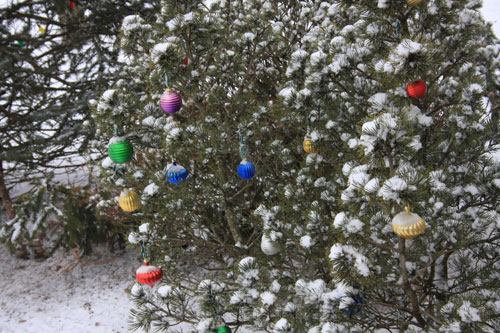
Christmas decorations in snow.
(*photo credit)
December 24, 2010
The Art of Preparing for a Great Event
There are two basic
extremes in preparation for an event: get all the minutiae in perfect order; or
letting things happen as they will. In my compulsion for orderliness, I stand
in the former position, although I know perfectly well that memorable events
have occurred without the Martha-like detail and concerns. Having said this, we
all need to take a balanced position of making sure events occur in good order,
and yet do so without overly exerting ourselves to such a point that we miss the
significance of the event itself. That balanced approach includes:
* Schedule plenty
of time for each portion of the preparation. If you are to have a gift
exchange tomorrow, do not wait until today to get all the presents assembled;
* Get others
involved. Establish a program with as many as possible involved in the
preparation and in the actual event. Make sure that all who ought to feel
invited are properly informed. Afterwards, the lasting memory includes that
personal involvement.
* List details in
writing so that one has a clear understanding as to who gets the room in
order and who selects the music. Compiling fine details too far in advance
verges on the minutiae folks' approach, but pinpointing general details allows
informal people to see that some things ought to be done early -- and keeps the
fretters allayed. Parties take some preparation.
* Accept the two
types of people as involved in this event, whether a formal religious
occasion or a social party, and be willing to live with and satisfy to some
degree both types -- minutia folks are taken up with details and relaxed ones
with omitting fine details;
* Expect the
unexpected and even plan for it, for storms arise and accidents occur. Meet
all adversity with equanimity;
* Reflect on the
significance of the event. Give some time the day before to consider the
spiritual significance of Christmas or the event at hand. Thank God for the
opportunity to be present and to assist in making this a memorable occasion for
others. Our serving others as best we can is itself part of the ingredients
that ought to be remembered.
* Thank God
afterwards. Realize that the occasion may have proved different from what
was anticipated. Nothing in this world is perfect and so the gathering may not
meet over-expectations. That is a good reason to let it come as it does.
Prayer: Lord,
tomorrow is Christmas. Help us plan to celebrate this event, realizing that
this is a happening that you planned in the fullness of time, and we are mere
participants. Give us a sense of how to celebrate this day in the fullness of
Spirit and to assist others in doing the same.

An assortment of gifts.
(*photo credit)
December 25, 2010
The Ultimate Christmas Gift
Send victory like
a dew you heavens, and let the clouds rain it down. Let the earth open for
salvation to spring up. Let deliverance, too, bud forth which I, Yhwh, shall
create.
(Isaiah 45:8)
At Christmas we
celebrate the coming of the Lord in a special way, a profoundly gentle way that
only the mercy of God can give us. A Christmas card says it all in the awe and
wonderment in the eyes of young shepherds looking at the infant. The artist
captured by picture what fails us in words written or spoken. Our past recedes;
our future is beyond the horizon -- but the present moment consists of a gaze
into the crib. Jesus comes to us here and now, something children grasp better
than adults. Here, like mountains and bluegrass, Heaven and Earth kiss.
We are grateful --
* for having been
saved by the Messiah and being invited into the saving process as a
member of the divine Family;
* for adequate
health to be present and alive right now;
* for the good
food and essentials needed to live this year including gardens, fields,
woods, and ample fresh water;
* for the
gratitude of the poor who seemed so much more thankful for gifts given this
year then in times past;
* for the
awakening of poor nations who call for proper compensation for the
wrongdoing of past and present;
* for peacemakers
who speak out in this war-torn world, even amid the horrible pressure of the
military/industrial complex to pursue goals through military means;
* for our Holy
Father and his writings, talks and general leadership;
* for all
guardians of the faith who constantly call us back to examine our ways of
doing things so we do not lapse;
* for the insight
to see the connection between environmental problems and our economic system
-- and the need for change;
* for benefactors
willing to support unpopular causes and for the nine million who visited the
Earthhealing website;
* for freedom
to communicate at low costs to people in 115 countries and to prepare to publish
books in the coming year; and
* most importantly,
for experiencing Christ's presence in our midst in a special way this
Christmas.

Baking Christmas cookies from traditional family technique.
(*photo credit)
December 26,
2010 May All Families Be Holy
And who is this Jesus?
The early church asked this question and so do people in every age. Parts of
the Luke and Matthew infancy narratives seek to answer this. Joseph Fitzmyer
says that there is a historic nucleus to those parallel stories: the
reign of Herod, the virgin Mary, Joseph being of the House of David, angelic
announcements, Jesus as Son of David, the Holy Spirit, Joseph not being
involved, the name "Jesus," Savior, born after Mary and Joseph came together,
the birth place of Jesus in Bethlehem, and the childhood in Nazareth.
Flight into Egypt.
Abraham Lincoln summed up his youth's history as "I was a poor boy" and much of
his hidden life was turned into a myth with a historic nucleus. Matthew's
Gospel of the flight is the struggle of a poor refugee family, not unlike the
journey of millions this year alone. During the Christmas season we travel with
the infant in the womb as we prepare ourselves to be a new light to the world.
We travel with Joseph, Mary and with the child Jesus. Here a journey or a toil
for accommodations are rudimentary and the destination uncertain. We too are
itinerant people heading to a destiny we cannot fully visualize.
We are descendants of
people of faith. They believed in the future to such a degree that they bore
and nurtured children; yet for 99% of us, our ancestry is only a few generations
of names and dates. We honor their graves; we remember them in our
celebrations; we hold their photos in revered places. To look back
occasionally, though not walk backward lest we stumble, is a way to get our
perspective on life's journey. The story will end in a cave in Bethlehem, or
the flight into Egypt. We are meant to be going to the light -- the distant
place where things will be better. Our journey of faith started with our
ancestors who nurtured us in faith and love.
Similarly, we look
ahead and hope that things will endure. God is faithful and loves us as we are
here and now. To begin to achieve HERE within ourselves is a more perfect
harmony; NOW we are capable of extending our love out in space and time to those
in need. We remember our past and those deceased loved ones; and we await the
future in hope. Our present moment is built on love, and this virtue alone will
last when faith and hope fade away. Familial love enhances the present moment
for all of us.
People are mobile.
These are difficult times for migrants, refugees, or those from broken homes.
Modern communication helps us keep in touch, but it takes an effort to hold
things together. Mary, Joseph, and Jesus were refugees from a tyranny, and so
are many others today.
Prayer: Lord,
help us to emphasize family-centered togetherness that includes celebrations,
gatherings, and sharing of our lives with those nearer and dearer to us. We
could call on Joseph and Mary, the first Christian refugees, to show us the way.
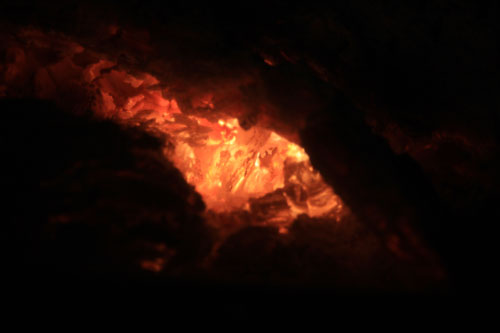
Glowing embers from fireplace.
(*photo credit)
December 27, 2010
Healing Benefits of Classical Music
As we rest a little
after Christmas events, nothing is better than good music to help us relax. My
apologies for having written about two thousands essays related to healing our
wounded Earth, and not a note about the classical music that I listen to several
hours every day. Perhaps it is because we do not conceive of something so
pleasing as music in a pragmatic sense. Or maybe it is the sacred nature of
music that makes us want to keep it respected and untouched and even
unmentioned. No excuses suffice.
The experts give good
music credit for relieving human ailments and for a wide variety of benefits.
Some credit Mozart's works with increasing the intelligence of unborn babies.
Those youngsters also can have teaching enhanced with the proper soothing
sounds. By teenage years, music often plays a role but here the detrimental
nature of loud music as the onset of deafness has been cited as a music minus.
Elders are known through a variety of studies to be comforted by classical music
and this includes with strengthening those with illnesses both physical and
mental. The role of music in meditation and prayer is evident to many
worshippers and has led to great advances in sacred music.
The value of music
for pets is more documented than for other domesticated animals or wildlife.
However, some admit that experimental animals and draft animals (horses, oxen,
etc.) perform better with good and soothing music. Daily, people will attest to
that. In the inverse, loud music can affect the performance of these animals. In
my youth, we knew that loud or rumbling music disturbed our dairy cows and
prevented their being properly milked. I greatly suspect that not all animals
have such discriminating tastes, for some dogs seem to thrive on all types of
music. However, soothing music is generally liked by many.
As reported in The
Guardian Weekly (July 2, 2010), a German sewage plant pipes in music by
Mozart that the director, Anton Stucki, insists leads the bacteria to help make
a more efficient decomposition of the biomass in his plant in eastern Germany.
This person says he thinks the secret is in the musical vibrations, "which
penetrate everything, including the water, the sewage and the cells. It creates
a resonance that stimulates the microbes and helps them to work better."
Another Austrian sewage plant has also adapted the classical music approach and
the operators testify that this has reduced the cost of sewage treatment. No
details for subjecting gardens to classical music are given but if we speak and
garden plants respond, so do these more sophisticated plants respond to some
degree to classical music. Studies ought to be conducted on this subject. Most
likely, all involved in healing our troubled Earth demand the accompaniment of
good music.
Prayer: Lord,
help us to hear the heavenly court's music at a distance and, in a feeling
gratitude and joy, to move in that direction in our journey of faith.

Farm in rural Anderson Co., KY.
(*photo credit)
December 28, 2010
Facing Our Phobias, Especially Phobophobia
We prepare to enter
into another year, 2011, and we do not know what it will bring as far as global
security, national welfare, family and community relations and personal health
goes. Must we expect to be fearful or strive to be fearless and rid ourselves
of all fears, or is there a middling position?
The Greek-derived
word, Phobia, refers to an irrational, excessive or persistent fear of a
particular thing or situation or types of people. Hundreds of types of fears
have been unearthed ranging from ablutophobia (fear of washing or
bathing) to zoophobia (fear of animals). Some other examples include:
claustrophobia (fear of being in an enclosed space); hydrophobia
(fear of water); necrophobia (fear of death or dead bodies);
photophobia (extreme sensitivity to light); and Pyrophobia (excessive
fear of fire). A collection of all phobias
can be found by googling "Phobia Fear Release." This source includes some
surprises and some expected fears of heights, darkness, noises, or bears. If
anything, the listing can be a basic lesson in Greek or Latin vocabulary.
First we each ought
to know and list our own fears, some mild and some so serious that they result
in avoidance mechanisms and lack of coming to terms with certain behavior.
Knowing our phobias is the first step to becoming more balanced Earth healers.
Treating those (some say all are treatable) that hinder our mobility and
ministry could be a second step. Some fears may even prove a good thing given
our situations, addictions, struggles or propensities. For one struggling for
perfection, peccaphobia or fear of sin is a good; in fact, one (fear of
God) is regarded as a gift of the Holy Spirit. Proper fears may help or hinder
us. If we must ride a vehicle to do ordinary activities then autophobia
will have to be addressed. If the phobia is another person's, we may help them
ride the elevator or see the doctor.
Phobias occur within
other parts of the animal kingdom. Some dogs are extremely afraid of thunder
perhaps triggered by the sound (more than the lightning), and they will be
desperate to hide or get inside the house. One acquaintance had two dogs; the
senior male lost control in a thunder storm and the underling assumed dominance
in a very dramatic fashion. People will also show dominance by taking advantage
of those with phobias to threaten, laugh at, or impose practices that would
never be otherwise attempted had a phobia not expressed itself at given
situations. We become vulnerable during times when phobias express themselves,
and thus many of us have fear of fears -- phobophobia. "Don't be
afraid," the Lord tells the apostles and his audiences on various occasions and
maybe in our hopes of being fearless at all times we seek to suppress or hide
our fears. At times, it's best to say "I fear the speed you are traveling;" "I
fear for your safety."
Prayer: Lord,
allow us to be fearless when needed, fearful at the proper time and in some
challenging circumstances, and give us the wisdom to know the difference.

Warming rays of sunlight strike icy waters.
(*photo credit)
December 29, 2010
Prudence and Climate Change Deniers
Today's title has
three aspects: the virtue of prudence, climate change, and people who deny
human-caused situations. Taken individually they are interesting areas of
speculation; taken together these could be the ingredients of a perfect global
storm. Let us first look at each in turn.
Prudence is a
cardinal virtue related to sound judgment in practical matters. As we mature,
we ought to become less reckless in behavior. We learn to take enough
provisions on a journey; we speak in a civil fashion for assistance and
companionship; we drive with some degree of care and alertness; we do not
overuse food, drink, or prescribed pills; we dress warmly, and on and on.
Failing to act prudently results in acting recklessly, thoughtlessness, or a
misguided sense of privileged guardianship by parents, teachers, friends,
government regulators, medical doctors or just about anyone. On the other hand,
people do not want to be "prudes," or those overly concerned or modest about
proper behavior or speech. Prudence is practiced with discretion.
Climate change
is something that can be observed reasonably when close at hand. In late
summer, EnvironmentAmerica put out a report, "Global Warming and Extreme
Weather," that detailed expected hurricanes, coastal storms, extreme
precipitation, wildfires (1.2 million acres in California alone in 2008), and
heat waves (most can vouch for that in 2010). We hear that glaciers are melting
and ice sheets calving. Few deny the occurrence of climate change. However,
some latch on to "climategate" stories from 2009, and they deny human causes for
global warming.
Denying is not
a new art; in fact, one can find examples any place where human history is
recorded. Some people cannot face a sound judgment, and therefore refuse to
change or to initiate new practices. Some deny that the alarm has sounded or
that they have health troubles. Some deny what is evident to an astute
observer: the money flow indicates overspending; the military does not provide
security; or my personal health is not threatened by the undiagnosed aches and
pains. We all deny some things from effects of long-term eating practice or
shorter-term squabbles. Denial is common in coping with life's crosses.
Any one of the three
terms just described is of some value. Combine them and we could have a global
perfect storm, especially if climate change is caused by our own activities,
some of which we refuse to change through denial. The call to the virtue of
prudence is not necessarily going to settle the deniers, but it must be voiced
even when the witness is regarded as a disturber of peace -- or more accurately
the social tranquility. Confront deniers. Have them read James Hansen's
Storms of My Grandchildren: The truth about the Coming Climate
Catastrophe and Our Last Chance to Save Humanity (Bloomsbury 2009).
Prayer: Lord
teach us how to be prudent in troubled times.

Thorns of the honeylocust tree.
December 30, 2010
Let's Get Serious: Realistic Resolutions
Like most people, I'm
not an expert on resolutions, for I have forgotten or broken a great majority
over a long life. Frankly, part of the reason is that many resolutions are
unrealistic and are allowed to lapse. Often we are too discouraged to restart
them as the year moves along. Even such meaningful resolutions as cutting food
consumption, or reading more, or increasing physical exercise may seem easy on
January first and onerous on the thirty-first. Practices may be too vague, and
concrete results demand a longer- term persistence. Start with resolutions that
can succeed easily.
In resolution making
let's get serious; life is short and we need to conserve our time and effort.
We can have a moving prayer life while involved in activities that consume our
day, for we are to pray always. If there are periods of quiet and recollection,
all the better; but let's not so fix these that they hinder our daily
activities. The following areas may offer some success:
* Morning Prayer
-- Begin the day with the simple thanks that we have survived the night and are
prepared to make the day the best that is possible. Some make a meditation of
some definite length; however, rigid requirements may result in a failure that
compounds discouragement. Some start with the prayer of Matins and
continue with the hours with psalms and communal reflections.
* A Day's Offering
-- The average person will live about thirty thousand days, and that is a nice
array of human potential to give as an offering back to God. Merely offering
each day, even if for a single moment, for the good of others with whom we are
in some sort of contact will be of immense value to them and us. This is
especially true if we have aches and ailments of which there is no foreseeable
terminal point -- and yet we offer them for the good of others. Often we can
tell the person(s) for whom we make the offering. No matter what their own
degree of prayer life, most people appreciate our remembering them in a special
way.
* Individual Acts
of Gratitude -- Some time during the course of the day we could attempt to
just say "thanks" to another person or to the Lord for allowing us to breathe
and live. It only takes a moment to say "thanks," and it gives our ministry of
gratitude a boost; it permits our healing powers to expand in an inspired
enthusiasm that consumes our day in a spiritual way.
* Evening Examen
-- Complete the day with a review just before falling asleep; this is the day's
most important prayer according to St. Ignatius. I have found that a thankful
survey of what has been accomplished is at the heart of the review -- not a
feeling of guilt as to how things could have been done better. In some cases a
resolution for betterment may be called for.
Prayer: Lord,
help us to pray as best we can, to find the best periods of the day for more
formal prayers and to see life itself as an informal conversation with God.

(*photo by Kevin Millham)
December 31, 2010
Memorial to Kristin Johannsen (1957-2010)
Thanks to all our
Internet users for your loyal visits in 2010. Our "Daily Reflections" have been
visited by people from 113 countries, and our website received over ten million
hits in 2010. Your and our interests come together, and we continue to hope
that you benefit from these "Daily Reflections" and the photographs that
accompany each entry. Please help support our efforts through donations and
spreading the good word.
-------------------
The Blooming Cosmos
God comes to us in
gentle ways,
yes, in flowers,
when words have interlude,
and our hearing
sinks in utter solitude,
and future
chorus melts into a silent maze.
A cosmos bouquet on
Kristin's final day,
Kevin says it was
her favorite flower,
and has a photo of
her immersed in a Korean patch,
a celestial
rapture, a cosmic ray.
I sow cosmos, my
Grandma's favorite also,
among vegetables
to enliven and draw butterflies.
On this October
frost-prone day when impulse tries
to compost the
stripped stalk -- a voice says, "No."
After the funeral,
on returning from Wisconsin,
I find the stalk
is in full bloom,
even amid the
drought-ravaged, bone-dry garden.
Mini-miracle?
Natural autumn growth again?
Thus I gather the
fifteen blooms now here,
to adorn the Berea
altar at Kristin's memorial,
To show God's favor
rests on her writing career,
cut short at the
end of her fifty-third year.
My homily is meant
to touch what God lets us know
in the Good Book's
immortal words of love.
But we are
speechless in letting go of a friend,
Only cosmos'
brilliant pink says all miss her so.
When will the
blooming end? After shared words glow,
I return to the
garden and there the stalk
has bloomed again.
In dying, Kristin teaches us
that all is
a miracle for those
who let go.
Al
Fritsch, SJ Author and Earthhealing Team --
Mary
Davis, Editing Consultant
Charlie
Fritsch, Technical Consultant, EH Board
Janet
Powell, Web Manager, EH Board
Sally
Ramsdell, "The Golden Eagle"
Mark
Spencer, Technical Resources, EH Board
|